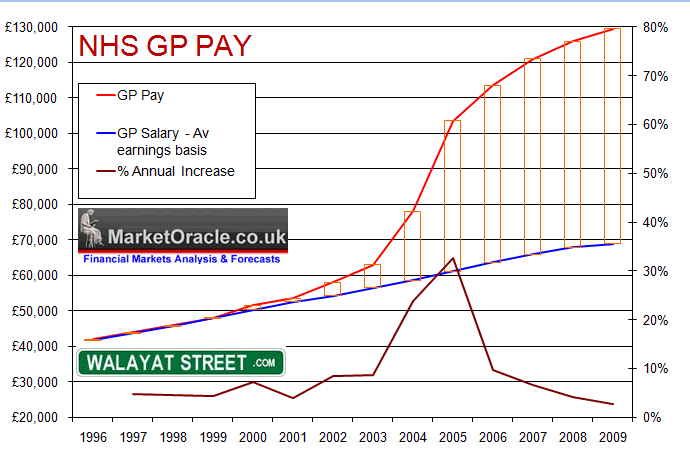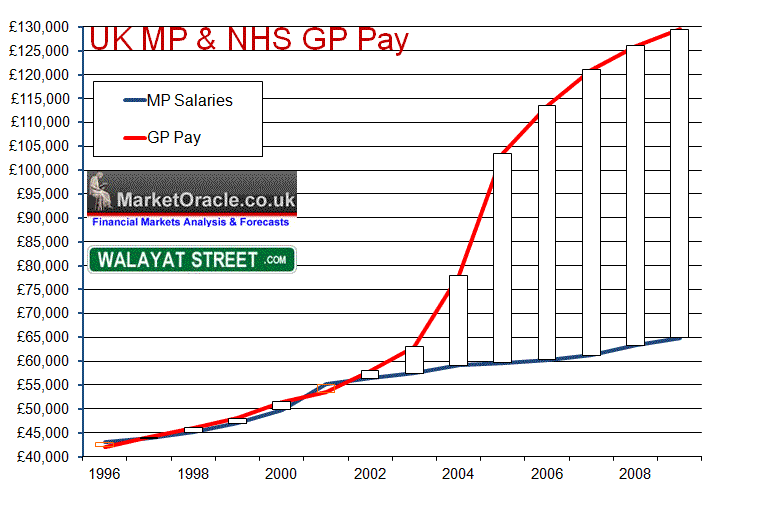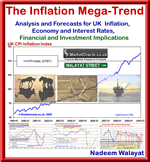Government Strategy Towards NHS Privatisation Via GP Doctors New Spending Powers
Politics / NHS Jul 12, 2010 - 03:20 PM GMTBy: Nadeem_Walayat
 NHS GP's are salivating at the prospects of getting their hands on a £70 billion annual pot of gold. The governments announced intentions are for the GP's to be able to manage most of the NHS existing budget to buy patient care from the NHS hospitals and clinics.
NHS GP's are salivating at the prospects of getting their hands on a £70 billion annual pot of gold. The governments announced intentions are for the GP's to be able to manage most of the NHS existing budget to buy patient care from the NHS hospitals and clinics.
The government aims to abolish the 151 Primary Care Trusts (PCT's) to be replaced by some 500 GP consortia, expecting the GP's to manage this large annual sum of money, so how much of it will be spent on administration rather than patient healthcare ? Buy in management ? GP's pay themselves large management fees ?
The government plan on face value appears as a recipe for disaster, especially as it is not the first time NHS GP spending reforms have taken place. Under Labour in 2002-2003 new GP contracts were issued with the aim of getting better value for money as GP's would be rewarded for delivering improved patient healthcare. Instead what actually took place was the complete opposite as GP's effectively rewarded themselves huge obscene annual pay rises of more than 30% per year whilst at the SAME time cutting back on hours worked as the below graph on GP pay illustrates.

During Labours early years GP pay had been tracking quite closely with that of average earnings, until the 2002-2003 GP contracts which sent increases soaring into the stratosphere culminating in pay rises of more than 30% per annum which effectively means that GP's are now paid nearly twice that of where there pay should be in terms of average earnings.
The Explosion in GP Pay contributed towards the MP Expenses scandal as when Labour came to power in 1997 average MP pay was £43,722 against average NHS GP pay of £44,000, so both were inline with one another at that time. However as the below graph illustrates in 2003 GP and MP pay started to see a serious divergence which ignited jealousy amongst MP's that directly led to the adoption of the policy of claiming expenses to the maximum so as to fill the ever widening gap between MP's and NHS GP's, as MP's could NOT get away with awarding themselves pay hikes of 30% per annum without losing their seats at the following general election in response to voter outrage, therefore across the board systematic abuse of expenses started to take place which basically meant real average MP pay was approx £98,000 per annum, still considerably less than where GP pay had risen to.

The Bottom line is GP's have demonstrated that they cannot be trusted with NHS budgets. A significant part of the £70-80 billion annual budget will be pocketed as increased salaries, management fees or as practice profits by GP's.
ConLib Government Strategy Towards NHS Privatisation
Clearly the announcement of the effective abolishment of the PCT's marks the first step in a series of future steps towards the privatisation of the NHS. The GP's receiving a budget of £70 billion per year will not lead to greater productivity, to the contrary it will lead to a less productive service just as as the Labour government experienced as it doubled the NHS budget but at the same time saw less productivity culminating in the 2002-2003 GP contracts which led to the implementation of the super surgeries to act as competition against GP Surgeries as a direct consequences of GP greed and lower quality of services.
Similarly GP's will become their own worst enemies as they seek to reward themselves with large chunks of the budget as management fees, thus angering the general public into supporting ConLib counter measures that will seek to introduce competition into the NHS system which amounts to privatisation of the NHS as increasingly the management of the GP consortia will be by private companies that will over time consume the GP surgeries that initially employed them, therefore this will result in a number of large private GP companies against which less efficient, traditional GP surgeries, even as part of large consortiums will no be able to complete and thus virtually ALL GP surgeries will become part of private companies.
But until then, the next few years are likely to see many headlines of how GP's are abusing their new spending powers by rewarding themselves huge obscene pay hikes and bonuses so as to dismantle the public persona of the concept of a public National Health Service.
In my view this is an inevitable outcome as the current NHS system is inefficient and none working as GP's treat patients effectively as ATM cards to swipe in and out of doorways to maximise surgery earnings with only lip service paid at actually diagnosing patients which means delayed diagnoses ultimately results in far higher costs for the NHS as illustrated by the recent National Audit Office reporting a picture of a widening gap in life expectancy between affluent and deprived areas of the country of more than 10 years as a consequence of GP's in deprived areas effectively ignoring the symptoms of their poor patients which results in less resources being plowed into high disease prevalence deprived areas in favour of more resources being directed to low disease prevalence affluent areas which reflects a failure of the GP's to do their jobs.
Department of Health - Tackling inequalities in life expectancy in areas with the worst health and deprivation
GP's provide the main access point to healthcare and are crucial to providing care to the neediest groups. The main lever for rewarding their activity is the Quality and Outcomes Framework which was introduced in 2004. However, it does not provide enough of an incentive to target GPs attention on the neediest groups. GPs can achieve full payment of the additional income available under this framework without covering the entire practice population and as a result the hardest to reach and most in need groups may not be helped through this framework. In addition, until 2009, payments were scaled in such a way that areas with high disease prevalence, often concentrated in deprived areas, received less remuneration per patient than those with low prevalence, and payments to practices did not fully reflect the level of illness in the practice population. By 2011, payments are expected to fully reflect the level of need with consequent redistribution of payments between practices.
NHS Competition For Patient Choice
Competition between surgeries and hospitals will drive out of business the incompetent GP surgeries as they lose patients and resources to the better run GP surgeries which can only happen in a private system of healthcare delivery, where patients could in effect be handed NHS credit cards to enable them to buy healthcare at ANY health facility whether NHS run or private, against the current system which effectively rewards failure whilst penalising success as all surgeries via allocation of resources are forced to revert towards an under performing mean.
Comments and Source: http://www.marketoracle.co.uk/Article21040.html
By Nadeem Walayat
Copyright © 2005-10 Marketoracle.co.uk (Market Oracle Ltd). All rights reserved.
 Nadeem Walayat has over 20 years experience of trading derivatives, portfolio management and analysing the financial markets, including one of few who both anticipated and Beat the 1987 Crash. Nadeem's forward looking analysis specialises on UK inflation, economy, interest rates and the housing market and he is the author of the NEW Inflation Mega-Trend ebook that can be downloaded for Free. Nadeem is the Editor of The Market Oracle, a FREE Daily Financial Markets Analysis & Forecasting online publication. We present in-depth analysis from over 500 experienced analysts on a range of views of the probable direction of the financial markets. Thus enabling our readers to arrive at an informed opinion on future market direction. http://www.marketoracle.co.uk
Nadeem Walayat has over 20 years experience of trading derivatives, portfolio management and analysing the financial markets, including one of few who both anticipated and Beat the 1987 Crash. Nadeem's forward looking analysis specialises on UK inflation, economy, interest rates and the housing market and he is the author of the NEW Inflation Mega-Trend ebook that can be downloaded for Free. Nadeem is the Editor of The Market Oracle, a FREE Daily Financial Markets Analysis & Forecasting online publication. We present in-depth analysis from over 500 experienced analysts on a range of views of the probable direction of the financial markets. Thus enabling our readers to arrive at an informed opinion on future market direction. http://www.marketoracle.co.uk
Disclaimer: The above is a matter of opinion provided for general information purposes only and is not intended as investment advice. Information and analysis above are derived from sources and utilising methods believed to be reliable, but we cannot accept responsibility for any trading losses you may incur as a result of this analysis. Individuals should consult with their personal financial advisors before engaging in any trading activities.
Nadeem Walayat Archive |
© 2005-2022 http://www.MarketOracle.co.uk - The Market Oracle is a FREE Daily Financial Markets Analysis & Forecasting online publication.



